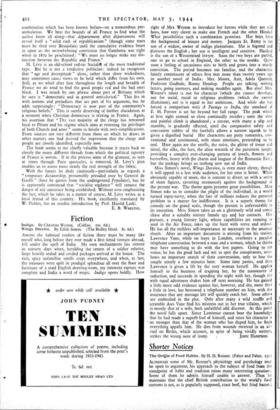Fiction
Indigo. By Christine Weston. (Collins. tos. 6d.)
Wings Deceive. By Edith Simon. (The Bodley Head. 8s. 6d.)
AMONG the habitual readers of fiction there must be many like myself who, long before they ever made a first timid venture abroad, fell under the spell of India. My own enchantment lies remote in nursery days when, heralding the imam of a soldier relative, large heavily sealed and corded packages arrived at the house. The rich, spicy unfamiliar smells crept everywhere, and when, at last, the treasures were spilt in prodigal splendour all over the floor and furniture of a staid English drawing-room, my innocent rapture was complete and India--a word of magic. Indigo opens boldly. How right of Mrs. Weston to introduce her heroes while they are still boys, how very clever to make one French and the other Hindu! What possibilities such a combination promises. Her boys have the background of leisure and money. Jacques St. Remy is the son of a widow, owner of indigo plantations. She is bigoted and distrusts the English ; her son is intelligent and sensitive. Hardyal is the son of a Westernised lawyer. Soon the two boys are parted, one to go to school in England, the other to The monks. Quite soon a feeling of uneasiness stirs to birth and grows into a sturdy conviction. The period becomes too familiar, and the characters faintly reminiscent of others first met more than twenty years ago in another novel of India: Mrs. Moore, Aziz, Adela Quested, Professor Godbole, Ronny Heaslop. PeoPle are talking, writing letters, going journeys, and making muddles again. But alas! Mrs. Weston's talent is not for character (which she cannot develop), nor for social, racial or religious problems (which she cannot illuminate), nor is it equal to her ambitions. And while she has forced a comparison with A Passage to India, the standard of E. M. Forster is set far beyond her full range. The peak which at first sight seemed so close continually recedes ; soon the slow and painful climb is abandoned ; a retreat, with many a slip and stumble, is gradually effected, until the comparative safety and convenient rubble of the foothills allows- a narrow squeak to be given a dignified burial Her characters are petty romantics, con- ventional and sentimental, with sham emotions, pretending to be real. Here again are the smells, the noise, the glitter of tissue and tinsel, the silks, the furs, the alien warmth of the persistent jungle, providing a complex ever-changing pattern of jewels, flowers and butterflies, heavy with the charm and languor of the Romantic East ; but the package brings us nothing new out of India.
Miss Simon's novel, Wings Deceive, is even more clever, though it will appeal to a less wide audience, for her tone is bitter. While obviously capable of more, she is content to divert us with a series of sham figures, cavorting strenuously against the background of the present war. The theme again presents great possibilities. Miss Simon asks us to consider the plight of the individual, in a world turned topsy-turvy, when the fate of millions reduces the personal problem to a matter for indifference. It is a superb theme for comedy on the grand scale, though the present is unfavourable to its execution. Miss Simon takes us on a gloriously wild and comic chase after a suitably sinister female. spy and her contacts. Her pursuer, a young literary light, whose capabilities are running to seed in the Air Force, takes up the hunt with verve and ardour. He has all the ruthless self-importance, so necessary to the amateur sleuth. After an important document is missing from his station, Lawrence Vane, while on leave in London, overhears a peculiar telephone conversation between- a man and a woman, which he thinks may have something to do with the lost papers. Going to the venue, he has the good luck and wit to spot the conspirators, over- hears an important snatch of their conversation, only to lose the couple utterly a few minutes later. Some time passes, and then Lawrence is given a lift by the very woman herself. He applies himself to the business of trapping her, by the manoeuvre of seduction, and succeeds in spending the night with her, though she with equal adroitness shakes him off next morning. He has gained a little more odd evidence against her, however, and she, more than a little in love, has bestowed a telephone number on him, with the- assurance that any message left will quickly reach her. Soon others are embroiled in the plot. Only after many a wild scuffle and scramble does Vane find his mistress out in her true villainy, which is merely that of a wife, both unfaithful and discreet. At this point the novel falls apart. Since Lawrence cannot bear the knowledge that he had made a superb fool of himself, and since his character is no stronger than that of the woman who has duped him, he finds everything appalls him. He dies from wounds received in an air- raid on Berlin, which account, in spite of being vividly written,






















 Previous page
Previous page